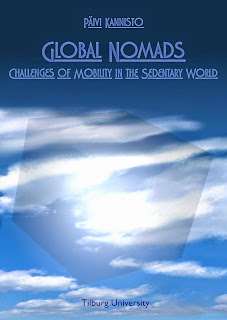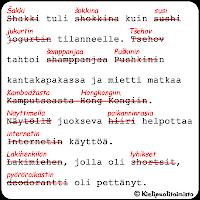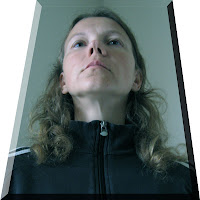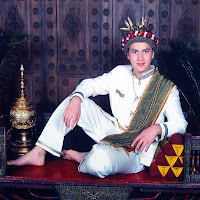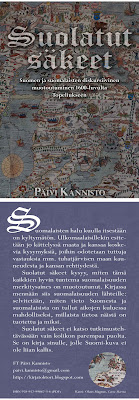Nomadiväitökseni Tilburgin yliopistossa Hollannissa
Vuonna 2010 haastattelin kolmeakymmentä nomadia, paikkariippumatonta matkailijaa jotka vaeltelevat maailman turuja ilman kotia, pysyvää työpaikkaa ja paikkaan sidottua ystäväpiiriä. Tästä projektista syntyivät yleistajuiset tietokirjat Free as a Global Nomad ja Elämäni nomadina sekä akateeminen väitös, jota puolustin Tilburgin yliopistossa Hollannissa 18.6.2014.
Väitöskirja sai alkunsa kun otin yhteyttä matkailututkimuksen professori Greg Richardsiin Tilburgin yhteiskuntatieteellisessä tiedekunnassa. Minut hyväksyttiin yliopistoon ulkopuoliseksi väitöskirjan tekijäksi, mikä antoi minulle mahdollisuuden jatkaa nomadielämää. Tapasimme Gregin ja toisen työn ohjaajan, Bertine Bargemanin, kanssa vasta pari vuotta projektin käynnistymisestä ja toista kertaa väitöksessä. Yhteistyö sujui sähköpostin välityksellä tehokkaasti.
Tutkimuksessa tarkastelen paikkariippumattoman elämäntavan haasteita. Vaikka liikkuvuuteen tänä päivänä rohkaistaankin, globaalit nomadit kohtaavat elämäntapansa takia monia ongelmia, sillä he kyseenalaistavat yhteiskuntien normeja ja arvoja kuten hyvinvointiyhteiskunnan ja säännöllisen palkkatyön tuoman turvan. Liikkuva elämäntapa tuo yhteiskunnille monia haasteita. Koska nomadit ylittävät valtioiden rajoja usein, he kyseenalaistavat nykyisen kansalaisuuden käsitteen ja liikkumisen vapauden. Elämäntapansa äärimmäisyyden vuoksi globaalit nomadit tarjosivat tutkimukselle mielenkiintoisen näkökulman: millaista elämä olisi, jos se olisi vähemmän sidoksissa kansallisvaltioihin sekä taloudellisiin ja tunnesiteisiin.
Väitöskirjan voi lukea Tilburgin yliopiston sivuilta osoitteesta https://pure.uvt.nl/ tai ladata hyperlinkitetyn PDF:n tai mobi-muotoisen sähkökirjan.
Hollantilainen väitöstilaisuus erosi jonkin verran suomalaisesta erityisesti muodollisuudessaan, kuten oheisesta, Santerin tekemästä videosta voi todeta. Tilaisuutta johti seremoniamestari, ja dekaani, vastaväittäjät ja työn ohjaajat olivat pukeutuneet samettisiin kaapuihin ja hattuihin. Tilaisuus oli suomalaista lyhyempi. Ensimmäisessä väitöksessäni istuin neljä tuntia kahden vastaväittäjän tentattavana, kun taas Hollannissa vastaväittäjiä oli neljä ja tilaisuus kesti tismalleen 45 minuuttia. Kun seremoniamestari tuli ilmoittamaan kyselytunnin päättymisestä lausumalla ‘Hora est’, väitöskomitea vetäytyi auditoriosta tekemään arvionsa. Kymmenen minuuttia myöhemmin minulla oli jo todistus kädessäni.
Hollannissa väittelijällä saa olla mukanaan kaksi avustajaa (paranymphs), mutta en nähnyt avustajia tarpeellisiksi. Koska he eivät kuitenkaan ole perehtyneet aihepiiriin, he eivät luonnollisesti voi vastata kysymyksiin, vaan tarjoavat lähinnä henkistä tukea väittelijälle. Mielenkiintoinen yksityiskohta oli myös se, että dekaani muistutti vastavalmistunutta tohtorin arvoon kuuluvista velvollisuuksista, kuten yhteiskunnan palvelemisesta, mikä on tietysti täysin nomadiselle maailmankuvalle vierasta.
Matkamme jatkuu nyt uusin tutkimus- ja kirja-aihein. Seuraavassa tutkimuksessa jatkan edelleen paikkariippumattoman elämäntavan parissa, mutta tällä kertaa työn näkökulmasta.
Valmistujaispuhe
Ladies and gentlemen,
the dissertation I’m defending today is about modern-day mobilities, viewed through the lens of location-independent travellers, the so called global nomads.
Mobilities have increased in recent years. International tourist arrivals reached a record high last year, over one billion. This makes travel and tourism an important industry, larger than, for instance, automotive manufacturing. Business travel creates new jobs and represents twenty per cent of the growth in global employment.
Mobilities are one the key dynamics of global change and they shape both societies and individuals. The more people migrate, travel and stay in other countries, the more old-fashioned such concepts as nation-state and citizenship become. Increased mobilities show that people do not naturally belong in one place only. Several places and cultures shape their lives, or – movement itself – as in the case of global nomads.
Global Nomads
Who are these global nomads I’ve been investigating? They have been wandering the world without a home, job and proximity of their friends and family for years. They are homeless, or—depending on your point of view—at home wherever they are.
Global nomads have made unusual choices in their lives. They have given up the safety nets of societies such as public health care, social security and insurance. Their lifestyle is a statement. They consciously try to detach themselves from their home countries and the constraints of societies in order to be freer. While societies are built with the intent of making things permanent and continuous, global nomads’ lives change as easily as the wind. By choosing to be homeless, they experiment with different forms of dwelling and being at home, and by rejecting regular income and work ethic based on the moral virtues of toil and diligence, they search for alternative ways of supporting themselves. They might use work exchange and hospitality exchange where no money changes hands.
The tensions between global nomads and societies become prominent in the ‘global nomad’ concept I chose for this research. The definition derives from cultural theorist Caren Kaplan (Questions of Travel: Postmodern Discourses of Displacement, 1996) who says: ‘[a] nomad is a person who has the ability to track a path through a seemingly illogical space, without succumbing to nation-state and/or bourgeois organisation and mastery’. In other words, nomads are free agents who dodge familiar structures trying to find their own way through the labyrinths of societies. In this process, they not only participate in defining and redefining mobilities but also societies because these two are intertwined.
Trends
Although global nomads are marginal in terms of number, the trends their lifestyle represents are not. These trends include individualisation of cultures, the rise of diverse lifestyles, and increased mobilities.
In the contemporary society, people’s lives are not so much defined by social hierarchies and traditional authorities. Instead, we all face a diversity of lifestyles and we need to maintain a sense of continuity in terms of who we are and how we should live. Many people value more and more this independence which is also wise as the European welfare states seem to be collapsing under too many demands and obligations, and the lack of resources.
More and more people also want a healthier work-life balance doing voluntarily part-time work and downshifting rather than committing themselves to long working hours or mortgages that tie them down for decades. All these changes in the general mentality influence work ethics and consumption habits, and they become apparent in people’s growing interest in alternative lifestyles and the search for the meaning of life.
As global nomad represent these trends in an extreme form, they offer an interesting object for research. Thus, through global nomads, we can sketch what life could be like if we were less tied to particular territories, financial and emotional attachments, and what are the current obstacles to a freer existence, if this is attainable.
The Research
To date, location-independence remains under-explored. Studies have concentrated on more purposeful travels that have a clear beginning and an end. The nomadic travel style, aimless wandering, is not always approved or encouraged in societies. As global nomads do not necessarily return back, their travels do not result in a direct financial contribution to the home country in the form of increased talent or income.
To understand what global nomads’ travels are about, we need to delve into issues of power. Alternative life choices are never unproblematic from the point of view of the individuals themselves, people around them, or the wider society. They involve a strong agency that goes against dominant models of thinking. From this perspective, it is relevant to understand how other people and societies use power over global nomads and how global nomads themselves facilitate power.
In this thesis, I study questions of power with the theories of French philosopher Michel Foucault who has inspired critical theorists across disciplines. In this context, power is a positive and productive network that pervades the whole of society. It is not possessed by an elite but it fluctuates in all social relationships. Power is, therefore, highly mobile as is becoming for the theme of this research.
The questions that I seek to answer include ‘What is about the nomadic travel style that so captivates and disturbs the more sedentary people?’ and ‘What are the factors that facilitate and challenge location-independence in the contemporary world?’ My research material consists of interviews with thirty global nomads, who were scattered around the world from Alaska to Fiji at the time, enriched with limited participant observation and virtual ethnography.
The research results show that there are more constraints to mobilities than societies are perhaps willing to admit. We continue to live in the world of nation-states and citizenships in which many people’s identities are in contradiction with the societies they live in. The good news is, however, that when these constraints are acknowledged and there is enough political will, they can be removed.
I hope that my work sheds light on the status of mobilities, the emerging field of extreme mobilities, and hopefully inspires further studies. Thank you.

